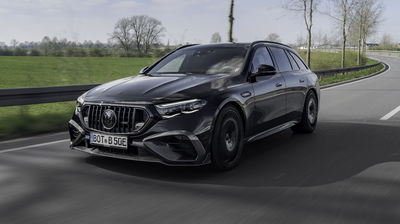Porsche's Sports Car Boss Says Engines Will Get Bigger, But It's Not All Good News

This week we found out that the 992 Porsche 911 isn’t in line to receive the 4.0-litre ‘9A2 Evo’ engine used for the 718 Cayman/Boxster GTS, GT4 and Spyder. However, the 911 will be getting bigger engines a little further down the road, albeit not by Porsche‘s choice.
Speaking to Australian publication Wheels, , Porsche sports car boss noted that the EU7 emissions regulations will result in engine capacities going up.

“We will see a big change because it means for everybody, new engines and we will see bigger displacements coming back again,” he explained, adding, “I expect 20 percent more displacement on average for these EU7 capable engines. A lot of manufacturers will jump from four to six, from six to eight [cylinders]”.
The rules will involve a power limit per litre, forcing manufacturers to shift more models to pure electric and hybrid powertrains. For the solely internal combustion engined cars left, catalyst sizes will need to increase three or four times, Walliser predicts, resulting in “a small chemical industrial factory in the car”. The move will prove “counterproductive,” as CO2 emissions will most likely rise, he notes.

The 911 will need a whole new engine, which “especially for the 911 this gets really, really difficult,” Walliser says, referring to the rear-engined car’s relatively small share of Porsche sales. He’s determined to make it work, however, and in a way that involves keeping the six-cylinder format.
You wouldn’t want to be against Porsche pulling it off. After all, against all reasonable expectations, it’s currently preparing a 992 911 GT3 (above) which will still use a large-capacity, naturally-aspirated flat-six. On that subject, however, there is sadly an end in sight for such engines.

“At the moment, we only see a turbo solution. Naturally aspirated, not really,” he said, concluding, “There will come a day, within the next 10 years, when we have to say ‘Now this is the last of its kind.”














Comments
it will be a sad day in automotive history when the last N/A 911 rolls off the production line
And it will be such a collector car ! THE last, true N/A Porsche.
Power limit per liter? WTF? Literally limiting efficiency
I wonder if that’s a typo, hopefully?
I wondered about the “efficiency” part, but understood later on. Talking only about naturally-aspirated road-legal engines, higher compression ratios have enabled 80 bhp car engines in 1 litre displacements to exist today, versus the 80 bhp 8 litre engines the world had maybe before the 1940s. Fuel economy has also increased, and emissions decreased. Limiting specific output will be an extremely stupid move, no two ways about it.
Man, fuск the EU and their stupid regulations
Exactly
FU EU
Meanwhile Mercedes: Eight cylinder to four cylinder
next generation AMG C63 will have the 6.9 from the red pig and the new passat will have the 6.0 W12 again. Bentleys will go back to the 8 litre blower engine and FCA will put a 392 hemi in the new giulia
that sounds like heaven
Wait. A power limit per litre? Why does that seem utterly asinine to me?
EDIT: Limiting specific output will actually be an asinine move, because during the early days of the car, engines had such low specific outputs and compression ratios, they gulped fuel like crazy. When looking solely at naturally-aspirated petrol/gasoline engines, they indeed have come a long way from the olden times, with far higher compression ratios, better specific outputs and fuel economy as well. I used to believe EU legislators think through before passing and enforcing regulations, but this is just terrifyingly stupid.
F the eu
Repasting my comment here because my old comment was utterly lacking in information, and I don’t think it’ll be as visible.
Limiting specific output will actually be an asinine move, because during the early days of the car, engines had such low specific outputs and compression ratios, they gulped fuel like crazy. When looking solely at naturally-aspirated petrol/gasoline engines, they indeed have come a long way from the olden times, with far higher compression ratios, better specific outputs and fuel economy as well. I used to believe EU legislators think through before passing and enforcing regulations, but this is just terrifyingly stupid.